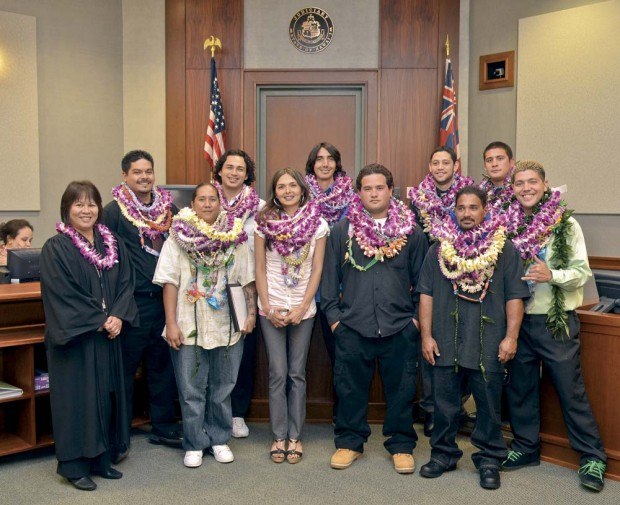LIHU‘E — Eight years later, a program that serves as an alternative to incarceration continues to help Kaua‘i residents break free from drugs and reintegrate into society. “Drugs is an equal opportunity destroyer,” Melanie Lum told the 17th graduating class
LIHU‘E — Eight years later, a program that serves as an alternative to incarceration continues to help Kaua‘i residents break free from drugs and reintegrate into society.
“Drugs is an equal opportunity destroyer,” Melanie Lum told the 17th graduating class of the Kaua‘i Drug Court. “It sucks the life out of you. It sucks the life out of your family.”
But life, she said, is more rewarding than getting high.
As a 2007 graduate of the diversion program, Lum said the lessons she learned in drug court have carried her through more than four years of sobriety, strengthened her relationships with her children and boyfriend, and have allowed her to keep a decent job.
Lum, drug court probation officers and others involved in the program hope that Friday’s 10 graduates will take the same lessons to heart, so they may lead productive, drug-free lives.
Drug Court Judge Kathleen Watanabe said since the program was established about eight years ago, 95 people have graduated. Only two reoffended and have felony convictions.
“Today means the celebration of your hard-earned success. You should applaud yourselves for that,” Watanabe told the grads. “It also marks the threshold … to apply what you learned while you were part of drug court.”
The courtroom — which brimmed with graduates’ family and friends, along with the mayor, Kaua‘i County Council members, the police chief and other officials — exploded with applause.
Looking at the former drug court “clients” seated in the jury box of her courtroom, the judge said she liked their placement.
“The next time you come back to court, let it be as jurors.”
One graduate came to the program on Feb. 17 as a condition of his probation.
“Upon induction, he informed this officer that he knew what direction he wanted to go with his future, but is taking baby steps because he learned from his past that if he rushed into things too fast, he tends to screw up,” said Drug Court Probation Officer Tori Ann Laranio, as she introduced Lloyd Palmeira.
He has now been clean and sober for 434 days.
Palmeira, his neck hidden by lei, said he has struggled with drugs since he was a child.
“I realized that I had a problem and at that moment, I made a change in my life that brought me to where I am today,” Palmeira said. “Two and half years clean — the longest I have ever been since I was 11 years old.
“I won’t ever forget where I came from because I never want to go back there again.”
Laranio said another graduate, who was not her client, surprised everyone with his progress. Christopher Kelly Corbett was the closest to being terminated from the program after running off to Brown Mountain, Calif., for a year.
He returned on his own, threw himself on the mercy of the court and never messed up again, she said.
“He came back a changed person,” Laranio said. “He worked his butt off and graduated today.”
Corbett is now 362 days sober.
Other graduates took their time at the lectern to thank their loved ones, Jesus Christ and drug court judges.
Shyanne Morikawa thanked the Kaua‘i Police Department for arresting her. Since inducted into the program on July 29, 2009, Morikawa is part of the workers’ union at her job and may go back to school to finish her education. As of Friday, she is 529 days sober.
“Today, I have no desire to pick up and use,” Morikawa said.
Established in 2003, the Kaua‘i Drug Court was created as a response to community outcry for more effective programs and to help offenders with substance abuse problems, a program handout states.
The mission of drug court is to divert those non-violent offenders to treatment and rehabilitation. It is considered an alternative to incarceration.
Laranio said clients join either pre-conviction or post-conviction. In the first category, graduates have all their felony charges expunged.
“It will make their records look that much better for job purposes,” she said.
In the second, graduates’ probation periods are shorter and they learn more tools to maintain sobriety.
During the program, all participants have to participate in treatment, random drug testing and weekly review hearings in court. That way they are held accountable to fulfilling those obligations.
“That’s why our program works,” Laranio said.
Kaua‘i County Councilman Mel Rapozo told the graduates not to screw up. He explained that the program, their newfound sobriety and orders of dismissal are a gift.
“It’s not going to come again,” Rapozo said. “… Don’t forget your mistakes, but don’t dwell on them.”
• Jessica Musicar, staff writer, can be reached at 245-3681 (ext. 224) or by e-mailing jmusicar@thegarden
island.com.


